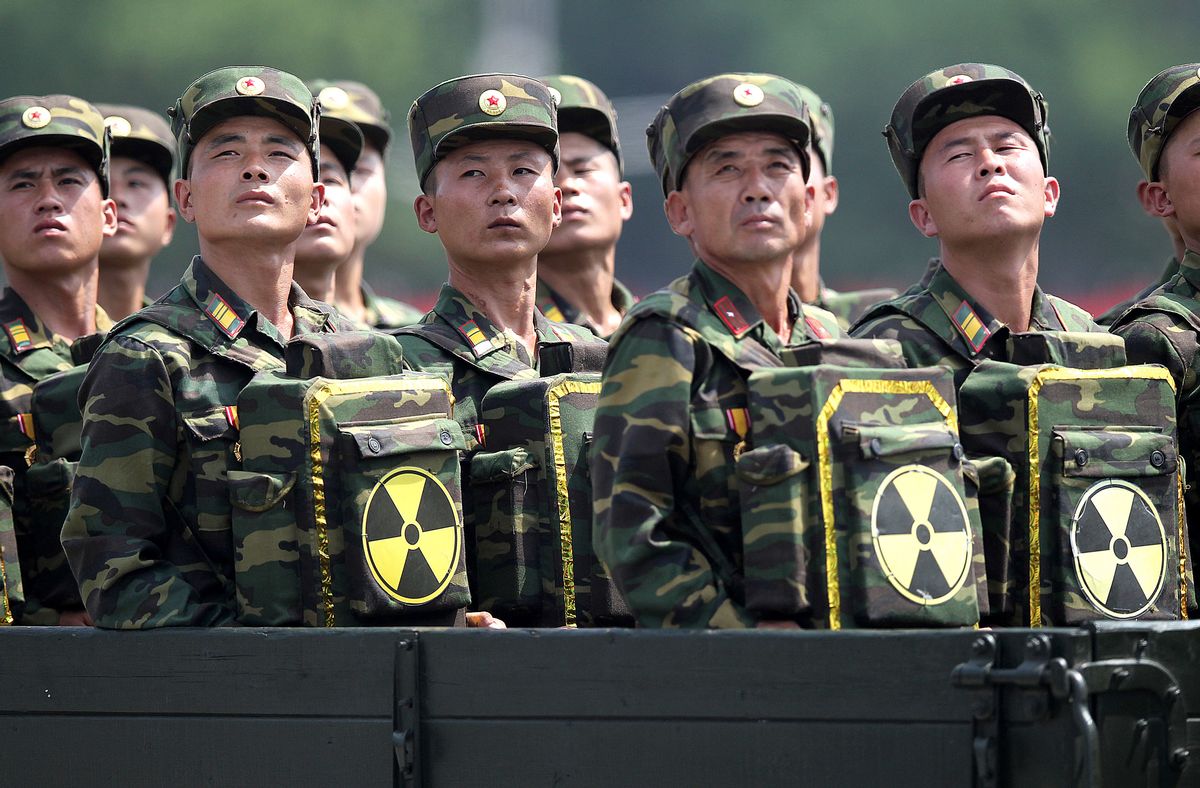“It won’t happen,” President-elect Trump tweeted January 2 about North Korea’s plans to develop a nuclear weapon capable of striking the continental United States.
North Korea just stated that it is in the final stages of developing a nuclear weapon capable of reaching parts of the U.S. It won't happen!
— Donald J. Trump (@realDonaldTrump) January 2, 2017
Six months later, “it” just came a lot closer to happening.
On July 4, North Korea successfully test launched a ballistic missile theoretically capable of hitting Alaska and Hawaii. The country's leader, Kim Jong-un, said the missile test was intended to “slap the American bastards in their face.”
The combination of Trump’s ignorance and belligerence has worried U.S. and international nuclear experts from the start of his presidency.
Now North Korea’s response to Trump—fast improving ballistic technology and Kim Jong-un’s own brand of belligerence — has the world growing alarmed.
South Korea felt obliged to respond with its own show of force, firing a barrage of ballistic missiles into the sea.
Russia joined with China to call on Trump to embrace a Chinese de-escalation plan designed to defuse tensions around Pyongyang's missile program, according to a Reuters report.
But Trump himself responded with a tweet suggesting that he was finished with working with China.
Trade between China and North Korea grew almost 40% in the first quarter. So much for China working with us - but we had to give it a try!
— Donald J. Trump (@realDonaldTrump) July 5, 2017
The top U.S. general in South Korea says only "self-restraint" is preventing war.
“Self-restraint, which is a choice, is all that separates armistice and war,” said General Vincent Brooks, referring to the 1953 cease-fire that halted though never officially ended the Korean War. “As this alliance missile live-fire shows, we are able to change our choice when so ordered by our alliance national leaders."
Needless to say, self-restraint has never been a strong suit of the American president.
Hype
The good news is that the danger posed by North Korea, while real, has been hyped by all sides.
North Korea encourages the notion that Kim Jong-un is a madman to increase its negotiating leverage over the outside world.
The United States encourages the notion that Kim is crazy to hold together an international coalition that has imposed sanctions on the North Korean government.
The advocates of missile defense system for the United States cite Kim’s alleged irrationality as justification for building an expensive weapons system that fails as often as it succeeds.
In fact, says Tom Collina, director of policy at Ploughshares Fund, a global security group in Washington, there is good reason to believe North Korea will be deterred from using its nuclear weapons out of fear of an overwhelming U.S. response.
“People freak out because American cities could be under threat, but we’re under that threat every day from Russia and China,” Collina said in an interview. “We don’t fear them because they are deterred. Well, North Korea is deterred too."
“They’re really good at preserving their family regime and power,” Collina said of Kim and his clan. “They’re not going to throw it all away for an attack that would invite all-out attack and destroy them.”
Is This How War Starts?
The danger is that Trump will feel boxed in by his ultimatum and believe he can eliminate the North Korean threat by destroying its nuclear facilities. Sen. Lindsey Graham has called for a preemptive military strike to prevent the deployment of a nuclear-tipped ICBM.
The problem with Graham’s proposal is obvious to military planners: North Korea could and would respond with a conventional missile barrage to devastate Seoul, the capital of South Korea, which is home to some 10 million people. Even if the North Korean artillery is overrated as some have argued, the “best-case” scenarios are still horrific in terms of civilian casualties.
That possibility deterred past presidents. It deters Secretary James Mattis, who said in May that a preemptive U.S. attack on North Korea would be "tragic on an unbelievable scale." But Mattis is not the president and Trump can order an attack without his consent.
The alternative is negotiations, as urged by former Secretary of Defense William Perry and five other former U.S. officials in an open letter to Trump.
“Pyongyang has shown it can make progress on missile and nuclear technology despite its isolation. Without a diplomatic effort to stop its progress, there is little doubt that it will develop a long-range missile capable of carrying a nuclear warhead to the United States,” the officials said.
The United States should explore what North Korea wants, says Collina, starting with a freeze on North Korea’s missile program and South Korea’s planned missile defense system.
“Today there is a window of opportunity to stop these programs [to build missiles and nuclear weapons], and it may be the last chance before North Korea acquires long-range capability,” the former officials wrote in their letter, which was released before the July 4 missile test.
“Time is not on our side,” the letter continued prophetically. “We urge you to put diplomacy at the top of the options on the table.”
What Happens Next?
Trump is uninterested in diplomacy. He has yet to appoint an ambassador to South Korea, and the State Department, with many top jobs still unfilled by the Trump administration, is ill-prepared for substantive talks.
Trump is losing patience with the Chinese, who think American belligerence drives North Korea’s provocative behavior.
And Trump has committed himself to preventing North Korea from gaining the ability to strike the United States, which it is poised to do sooner rather than later.
As the window of diplomacy closes, the window of war is opening.




Shares